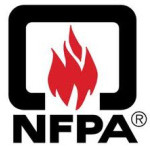- Industry: Fire safety
- Number of terms: 98780
- Number of blossaries: 0
- Company Profile:
Established in 1896, NFPA's mission is to reduce the worldwide burden of fire and other hazards on the quality of life by providing and advocating consensus codes and standards, research, training, and education.
The pressure at which the suit exhaust valve begins to open, releasing exhaust air to the outside suit environment.
Industry:Fire safety
The process of identifying a hazardous materials/weapons of mass destruction (WMD) problem and determining likely behavior and harm within the training and capabilities of the emergency responder.
Industry:Fire safety
The minimum heat flux at or below which there is no ignition.
Industry:Fire safety
The replacement in kind or strengthening of load-bearing elements; or the refinishing, replacement, bracing, strengthening, or upgrading of existing materials, elements, equipment or fixtures, or both, without reconfiguration of spaces.
Industry:Fire safety
The pulling force that is achieved by the powered rescue tool while operating at the rated system input at the position of the arms or piston where the tool generates its greatest amount of force.
Industry:Fire safety
The process of securing a subject in a transfer device, with regard to existing and potential injuries/illness, so as to avoid further harm during movement.
Industry:Fire safety
The reduction of available voltage at the load below the point at which equipment can function as designed.
Industry:Fire safety
The quickly repeated closure of the circuit to start a motor from rest for the purpose of accomplishing small movements of the driven machine.
Industry:Fire safety
The minimum vent diameter/area permissible for Category I appliances to maintain a nonpositive vent static pressure when tested in accordance with nationally recognized standards.
Industry:Fire safety
